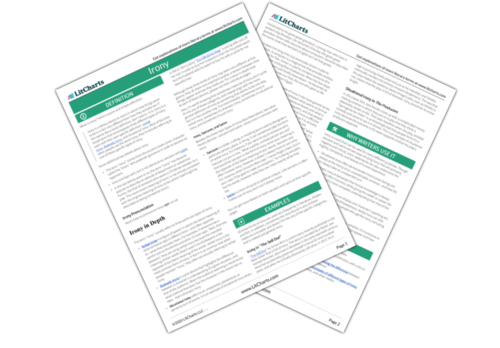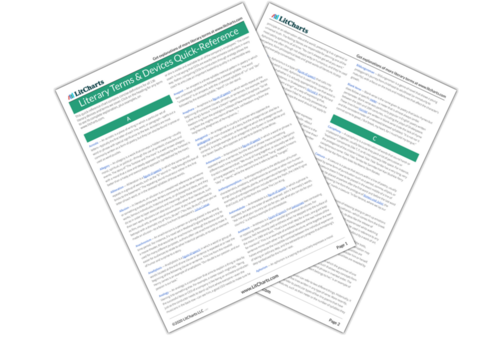Irony
Irony Definition
What is irony? Here’s a quick and simple definition:
Irony is a literary device or event in which how things seem to be is in fact very different from how they actually are. If this seems like a loose definition, don't worry—it is. Irony is a broad term that encompasses three different types of irony, each with their own specific definition: verbal irony, dramatic irony, and situational irony. Most of the time when people use the word irony, they're actually referring to one of these specific types of irony.
Some additional key details about irony:
- The term "irony" comes from the ancient Greek comic character called the "eiron," who pretends ignorance in order to deceive an opponent.
- Irony overlaps with, but is not identical to, sarcasm and satire.
- In the last twenty years or so, the term "ironic" has become popular to describe an attitude of detachment or subversive humor, like that of someone who wears a Christmas sweater as a joke. This more recent meaning of ironic is not entirely consistent with the original meaning of irony (a fact which itself might be described as being somewhat ironic).
Irony Pronunciation
Here's how to pronounce irony: eye-run-ee
Irony in Depth
The term "irony" usually refers to three particular types of irony:
- Verbal irony is a figure of speech in which the literal meaning of what someone says is different from—and often opposite to—what they actually mean. For example, if someone has a painful visit to the dentist and when it's over says, "Well, that was pleasant," they are using verbal irony because the intended meaning of their words (that it wasn't at all pleasant) is the opposite of the literal meaning of the words. Verbal irony is the most common form of irony. In fact it is so common that when people mention "irony," they often are actually referring to verbal irony.
- Dramatic irony Is a plot device that highlights the difference between a character's understanding of a given situation, and that of the audience. When the audience watching a movie know what's behind that door, but the character in the movie has no idea... that's dramatic irony.
- Situational irony refers to an unexpected, paradoxical, or perverse turn of events. It is an example of situational irony when, in the O. Henry story "The Gift of the Magi," a young wife cuts off her hair in order to buy her husband a chain for his prized watch, but the husband sells his watch to buy his wife a comb for her beautiful hair.
Although these three kinds of irony may seem very different at first glance, they all share one important quality: a tension between how things appear and how they really are. For a more in-depth look at each of these devices, please visit their individual pages.
Also, it's worth knowing that sometimes instances of irony don't quite fit into any of these categories, and instead align with the more general definition of irony as something that seems to be one way, but is in fact another way. Put more broadly: sometimes irony is verbal irony, sometimes it's dramatic irony, sometimes it's situational irony, and sometimes it's just irony.
Irony, Sarcasm, and Satire
Besides the three main types of irony described above, two other literary devices—sarcasm and satire—share a lot in common with irony:
- Sarcasm is a bitter, cutting, or mocking taunt used to denigrate a particular person, place, or thing. It can sometimes take the form of verbal irony. For instance, if you were to say to someone who had just cut you in line, "What a polite, civilized person you are!" that would be sarcasm in the form of irony, since your meaning is the opposite of the literal meaning of your words. Sarcasm very often involves irony. However, it doesn't always have to use irony. For instance, when Groucho Marx says "i never forget a face, but in your case I'll be glad to make an exception," he is being sarcastic, but his words, however witty they are, mean exactly what they say.
- Satire is a form of social or political critique. Like sarcasm, it often makes use of irony, but it isn't always ironic.
You can get more details on both sarcasm and satire at their specific pages.
Irony Examples
All three forms of irony are used very frequently in literature, theater, and film. In addition, sometimes the irony found in any of these mediums is broader and doesn't fit into any of the specific categories, and is instead just general irony.
Irony in "The Sell Out"
"The Sell Out" by Simon Rich is a short story recently published in the New Yorker that is full of irony. The story is narrated by a Polish Jew named Herschel, who lives in Brooklyn in the early twentieth century. Herschel accidentally preserves himself in brine for one hundred years, and when he is finally discovered, still alive, in 2017, he is introduced to his great-great-grandson, a young man who lives in present-day Brooklyn. On Herschel's first day, the great-great-grandson Simon tells Herschel about computers. Herschel describes the scene (note that Hershel's English isn't all that great):
It takes him long time, but eventually Simon is able to explain. A computer is a magical box that provides endless pleasure for free. Simon is used to constant access to this box—a never-ending flow of pleasures. When the box stops working—or even just briefly slows down—he becomes so enraged that he curses our God, the one who gave us life and brought us forth from Egypt.
This description is a great example of irony in the most general sense. The humor stems from the disparity between what seems to be true to Herschel (that computers are magic pleasure boxes) and what is actually true (that computers are, well, computers, and that people are kind of stupidly addicted to them). The use of irony is effective here because Hershel's description, as outlandish as it is, actually points to something that is true about the way people use computers. Therefore, the disparity between "what is" and "what appears to be" to Herschel isn't merely a comical error; rather, it's ironic because it actually points to a greater truth about its subject.
Verbal Irony in Don Quixote
One famously ironic work is Miguel de Cervantes's Don Quixote. At one point, the book's narrator states:
… historians should and must be precise, truthful and unprejudiced, without allowing self-interest or fear, hostility or affection, to turn them away from the path of truth, whose mother is history.
We can identify the above quotation as an example of verbal irony if we consider that the book's hero, Don Quixote, is fundamentally incapable of distinguishing truth from fiction, and any historian of his life would have to follow a double track of reality and fantasy which continuously overlaps, tangles, and flips. One of the most basic premises of the book is that truth is more difficult to identify than it may seem. Therefore, when the narrator vows to follow the single path of truth, he is being ironic; in reality, he believes this to be impossible.
Dramatic Irony in Othello
The device of dramatic irony is especially well-suited to the theater, which displays constantly shifting sets, scenes, and characters to a stationary audience that, therefore, often has a more complete or "omniscient" perspective compared to any of the characters. One excellent example of dramatic irony can be found in Shakespeare's Othello.
Through the play, the audience watches as Iago plots against his commander Othello, and seeks to make Othello believe that his wife Desdemona has been unfaithful to him. The audience watches as Iago plots to himself and with others. Sometimes Iago even directly reveals his plans to the audience. Meanwhile, Othello continues to trust Iago, and the audience watches as the the plan they know that Iago is pursuing slowly plays out just as he intended, and Othello eventually murders the entirely innocent Desdemona. The way that the play makes the audience aware of Iago's plot, even as Othello is not, means that the play is full of dramatic irony almost for its entire length.
Situational Irony in The Producers
In this classic film, two friends come up with a complicated money-making scheme in which they put on a play that they think is absolutely certain to fail. Their plan backfires when the play, entitled "Springtime for Hitler," is so shockingly bad that people think it's a comedy and come to see it in droves. This is an example of situational irony because the outcome is the exact opposite of what the play's producers expected.
Why Do Writers Use Irony?
Irony is a tool that can be used for many different purposes. Though sarcasm and satire are two ways of using irony that are primarily negative and critical, ironic statements can also underscore the fragility, complexity, and beauty of human experience.
- Situational irony often demonstrates how human beings are always at the mercy of an unpredictable universe—and that life can always take an unexpected turn.
- Dramatic irony emphasizes that human knowledge is always partial and often incorrect, while giving the reader or viewer the satisfaction of a more complete understanding than that of the characters.
- In dialogue, verbal irony can display one character's sparkling wit, and another character's thickheadedness. Verbal irony can also create a connection between people who get the irony, excluding those who don't.
Ultimately, irony is used to create meaning—whether it's humorous or profound—out of the gap between the way things appear and how they actually are.
Other Helpful Irony Resources
- The Wikipedia page on irony: A helpful overview.
- The dictionary definition of irony: A basic definition, with a bit on the etymology.
- The comedian George Carlin explaining the difference between situational irony and mere coincidence.
- A site with a helpful index of examples of different types of irony in television, film, video games, and other media.











